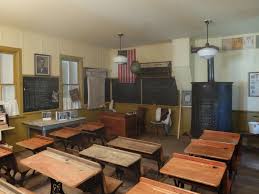
No matter how long it has been since you sat behind a school desk, you carry that school desk with you throughout life. For better or worse. With memories good and bad.
For teachers, the bittersweet memories consist of two pasts harmonizing fitfully: a student past first and a teacher past second. Perhaps no poems nails the teacher past as nicely as one of Edward Hirsch’s appearing in the September / October issue of The American Poetry Review.
“Days of 1975” treads on tricky territory. We’ve been here before. Some call it sentimentality (negative connotation) and some nostalgia (positive). Totally avoiding the former and going lightly on the latter is one of the tougher tasks a poet can undertake. Take a look at how Hirsch handles it here:
Days of 1975
by Edward Hirsch
It started with the tattered blue secret
of Bashō, that windswept spirit,
riding my back pocket for luck.
It started with a walk
through the woods at dawn,
mud on my new shoes,
high humming in the trees.
I was not prepared for the scent
of freshly turned soil
to pervade the empty classroom
or the morning to commence
with a bell that did not stop
ringing in my head.
So many expectations filed
noisily into the room–
I was ready to begin.
From the tall windows
I could see a storefront church
opening on the other side
of the polluted river.
I remember walking past the rows
and rows of bent heads,
scarred desks,
and gazing up
at the Endless Mountains.
In those hopeful days of 1975
I drove the country roads
in honor of radiance.
O spirit of poetry,
souls of those I have loved,
come back to teach me again.
Starting with an invocation to one of the greatest masters of haiku gives Hirsch immediate leeway. Both the Japanese and the Chinese poets were masters of brevity, imagery, nature, the senses. More still, they were masters of the unstated, which plays no small role in Hirsch’s poem.
Thus, the luck of Bashō in the back pocket of this (probably young) teacher beginning his journey; thus, the walk through the woods before school and the smell of mud under new shoes in the classroom. The spirit has entered!
For teachers, the sad beauty of the poem lies in phrases like “So many expectations filed / noisily into the room” and “I remember walking past the rows / and rows of bent heads, / scarred desks….” Perhaps others don’t know how difficult it is to fulfill the hopes of so many who are at such different levels of skills and who bring into the room so many different metaphorical crosses and satchels from home. But the good teacher must and the good teacher does his best.
The poem’s timelessness is evident when the teacher views the “Endless Mountains” outside those “tall windows” of what no doubt is a huge old brick structure with giant windows of the old style. The endlessness could be interpreted in many ways, whether it is one dealing with nature’s profusion and constant cyclical growth (from Bashō’s time to ours) or with the regenerative nature of students—each year the teacher ages but his students do not. They reappear each September, always in the same grade and always at the same age.
In the end, Hirsch goes where only the ancients and the confident dare tread by using the word (letter?) “O”: “O spirit of poetry, / souls of those I have loved, / come back to teach me again.”
Now the scarred desk is turned. Now the teacher, apparently aged and looking back many years, is pleading for the return of innocence and beauty — the “radiance” — that once filled his being, something he tried to share with his students.
I like how “souls of those I loved” is used as an appositive for “spirit of poetry” here. In that sense, observing beauty and capturing its transient essence in a poem is love. It is also the reason we write.